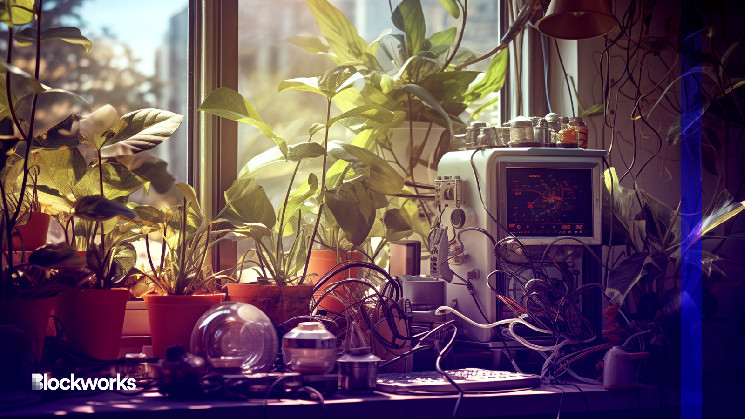Non-fungible plants.
They sound like something cooked up in a dorm room somewhere across one of the 23 legalized states.
Instead, this hazy Web3 fever dream comes by way of two academics from the Intellectual Property Centre Law School of Austral University in Argentina.
International IP law doesn’t fully cover the concept of unique plant varieties, say Miguel Rapela and Lucas Lehtinen. So, why not enforce a system that solves that with smart contracts?
Owners of the intellectual-planty-property could mint NFTs for every seed to be sold and flog them for crypto on the open market.
Say you’re a farmer who’s just spliced their way into a never-before-seen plant variety — like a type of corn that tastes like cotton candy. You would register the non-fungible plant variety (NFPV) with an Ethereum smart contract system and count the number of seeds collected — minting an ERC-721 token for each and every one.
Then, you’d run something of an initial coin offering (ICO) for those seeds, selling the NFTs via MetaMask, and, presumably, mailing out the physical seeds to buyers.
The Ethereum blockchain would automatically track provenance. This would establish a clear relationship between the creator of the plant (who also owns the related genome) and the buyer of the seeds.
A decentralized supply chain for seeds backed by non-fungible plant tokens. It’s a brain-wrinkling thesis that would make any LinkedInfluencer proud.
“Each digital token of an NFPV is backed by a seed unit of the same real-world variety produced that year by the breeder,” the authors wrote in a paper published in the January edition of the International Journal of Innovative Science and Research Technology.
“A digital token of an NFPV cannot exist without the backing of a seed unit of the same variety, nor vice versa…By the time the physical seed units are ready, they will have printed the QR code that identifies them with the NFPV purchased.”
The system could be applied to any plant varieties but would be especially suitable for specialty crops.
Our exit liquidity is coming pic.twitter.com/10esW3IyU6
— Alfa | ⟁ (@alfaketchum) July 19, 2023
All this is intellectually offensive on a multitude of levels. A thoughtcrime on par with the brilliant idea that destroying a diamond tied to an $NFT wouldn’t affect the value of the token at all.
Systems like these only make sense to terminally online folk hepped up on lengthy Twitter threads from McKinsey interns.
Yes, it’s possible to mint NFTs supposedly tied to anything. These systems already exist — mortgages, gold, Picassos and even farts in jars have all been sold as NFTs. Seeds could be just another example in a long list of weird stuff made possible by the blockchain.
But democratizing access to these assets injects a degree of trust that derails the whole endeavor.
In 2015, the world was forced to grapple with the Volkswagen emissions scandal — or Dieselgate. Volkswagen had coded its cars to only activate carbon controls when they were tested to see if they meet US regulations.
Test sensors picked up legitimate readings, but the input method was tampered with. The cars pumped out up to 40 times more carbon dioxide when driven in the real world.
It’s easy to see how a blockchain — supposedly an oracle of truth — could be fed illegitimate data designed to game markets. In the proposed seed system, the owner of the plant variety must promise that they don’t have a stash of seeds that don’t have a corresponding $NFT.
Price discovery for the seed ICO can only be effective if the market knows (and can verify) exactly how many seeds there are. If there’s three times as many sitting in a garden shed of some plucky seed farmer, then the whole market would be ruined and very likely go to zero.
Scarcity, when it comes to blockchain, may very well only make sense for digital artifacts. We know for certain that only 10,000 Bored Apes exist — it’s this knowledge that gives the market confidence to figure out what they’re worth.
There’d be no point at all if Yuga Labs only promised that there weren’t more Bored Apes somewhere on a hard drive.
One day, somewhere in the future when blockchains are ubiquitous across global supply chains, we’ll surely have to reckon with the fact that these systems only kick the “trust” can down the road.
In the meantime, we can do without the non-fungible plants.
 blockworks.co
blockworks.co
